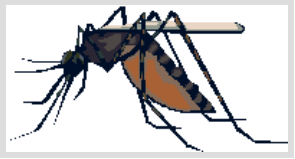Mosquito Control

The City of Joshua will continue to minimize the threat of West Nile Virus by monitoring mosquito activity in the City.
Residents are asked to participate in this program by reducing the number of breeding sites around homes and protecting themselves when outdoors.
Here are a few suggestions from the Center for Disease Control:
MOSQUITO PROOF YOUR HOME
Drain Standing Water. Mosquitoes lay their eggs in standing water. Limit the number of places around your home for mosquitoes to breed by getting rid of items that hold water.
Install or Repair Screens. Some mosquitoes like to come indoors. Keep them outside by having well-fitting screens on both windows and doors. Offer to help neighbors whose screens might be in bad shape.
Clean Up. Mosquito breeding sites can be anywhere. Neighborhood clean-up days can be organized by civic or youth organizations to pick up containers from vacant lots and parks and to encourage people to keep their yards free of standing water. Mosquitoes don’t care about fences, so it’s important to control breeding sites throughout the neighborhood.
PROTECT YOURSELF AND FAMILY WHEN OUTDOORS
Use Insect Repellent. Use on exposed skin when you go outdoors. Use an EPA-registered insect repellent such as those with DEET, picaridin or oil of lemon eucalyptus. Even a short time being outdoors can be long enough to get a mosquito bite.
Wear Appropriate Clothing. When weather permits, wear long-sleeves, long pants, and socks when outdoors. Mosquitoes may bite through thin clothing so spraying clothes with repellent containing permethrin or another EPA-registered repellent will give extra protection. Don’t apply repellents containing permethrin directly to the skin. Do not spray repellent on the skin under your clothing.
Be Aware of Peak Mosquito Hours. The hours from dusk to dawn are peak biting times for many species of mosquitoes. Take extra care to use repellent and protective clothing during early morning and evening, or consider avoiding outdoor activities during these times.
When dealing with West Nile Virus, prevention is your best bet. Fighting mosquito bites reduces your risk of getting this disease, along with others that mosquitoes can carry. Take the common sense steps below to reduce your risk:
- Avoid bites and illness
- Eliminate mosquitoes from the places where you work and play
- Help your community control the disease
Something to remember:
The chance that any one person is going to become ill from a single mosquito bite remains low. The risk of severe illness and death is highest for people over 50 years of age, although people of all ages can become ill. On-site sewage facilities (septic systems) provide an ideal habitat for the southern house mosquito, which might transmit viruses like West Nile. For more information on how to prevent mosquitoes from entering the tank, please see the informational flier below.
